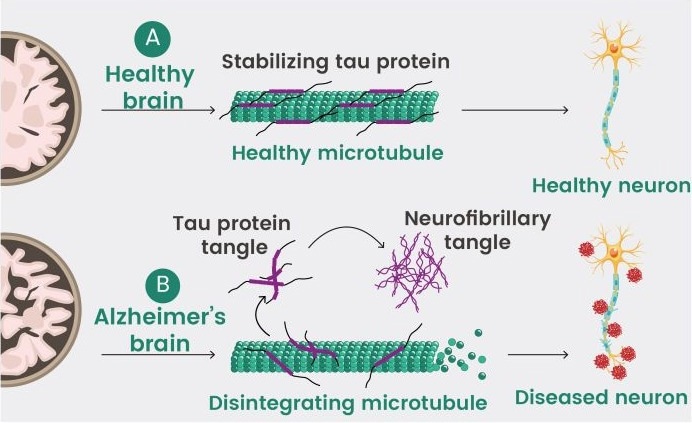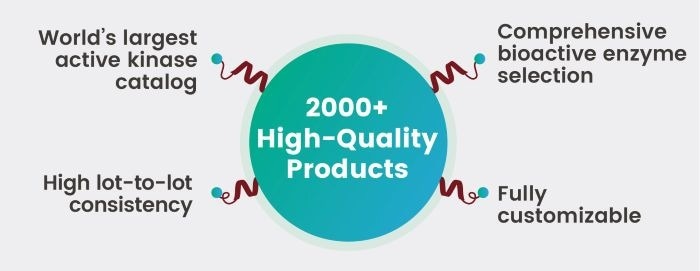Normally, Tau proteins stabilize microtubules and support neuronal function, but in neurodegenerative diseases such as Alzheimer's, they undergo abnormal changes that lead to aggregation and the creation of neurofibrillary tangles (NFTs).
These tangles impede cellular function, eventually leading to neuronal death and cognitive deterioration. Therapeutic strategies to treat tau abnormalities include kinase inhibition, aggregation prevention, immunotherapy, microtubule stabilizers, and gene therapy.
SignalChem Biotech contributes to these efforts by providing diverse recombinant Tau proteins for research, helping to advance tau-targeted therapeutics that may alter disease development in Alzheimer's and other similar tauopathies.
Understanding Tau pathology in neurodegeneration
When functioning normally, tau proteins bind to microtubules, stabilizing neuronal structure and promoting cell transport.
However, in tauopathies like Alzheimer’s Disease (AD), tau undergoes abnormal post-translational modifications such as hyperphosphorylation, acetylation, and truncation, resulting in separation from microtubules and aggregation within neurons.
These tau aggregates produce neurofibrillary tangles (NFTs), which are characteristic of AD and other tauopathies. As these NFTs accumulate, they impair neuronal function, impede axonal transport, and eventually result in neuronal death.
Importantly, the level of tau pathology is a better predictor of cognitive impairment in Alzheimer's disease than amyloid-beta plaques, emphasizing tau's relevance as a therapeutic target.

Figure 1. Physiological and Pathological Role of Tau Proteins. Image Credit: Sino Biological Inc.
Tau-targeted drug development strategies
Several strategies are currently under investigation for combating tau pathology, including:
1. Inhibition of Tau post-translational modifications
Tau hyperphosphorylation is a primary cause of tau aggregation. Therapeutic techniques look to suppress kinases like GSK-3β, which phosphorylate tau. Researchers are also investigating other changes that affect tau aggregation and disease, such as acetylation and O-GlcNAcylation.
2. Inhibition of Tau aggregation
Small chemical inhibitors can prevent tau monomers from aggregating into hazardous oligomers and filaments. These molecules are being developed to minimize NFT production and neuronal injury.
3. Immunotherapy
Immunotherapy techniques try to remove tau clumps from the brain.
- Active immunotherapy employs tau peptide vaccinations to activate the immune system to develop antibodies against tau.
- Passive immunotherapy uses pre-formed antibodies to eliminate pathogenic tau and stop disease progression.
4. Microtubule stabilizers
As tau loss impairs microtubule stability, scientists are investigating stabilizers such as epothilone D, which could compensate for tau malfunction, boost neuronal resilience, and lessen tau-mediated damage.
5. Gene therapy
Antisense oligonucleotides (ASOs) are being explored to reduce tau expression, which could reduce the creation of tau clumps and decrease disease progression.
SignalChem’s contribution
Such tau-focused techniques are promising for the development of disease-modifying therapeutics for Alzheimer's disease (AD) and other tauopathies.
With clinical studies in progress, researchers are making progress in understanding tau pathology and turning their findings into medicines that could change the course of neurodegenerative disorders.
SignalChem Biotech, a subsidiary of Sino Biological, produces one of the most comprehensive ranges of recombinant Tau proteins. Its selection includes Tau isoforms, phospho-Tau, and mutant variations, demonstrating SignalChem's commitment to providing high-quality reagents to help researchers in neurobiology.
SignalChem Tau competitive advantages
Native confirmations
- The majority of SignalChem’s Tau products are tag-free.
- Proteins mimic their natural structure and activity.
Flexibility in assays
Tag-free Tau proteins provide flexibility in assay design and development.
Clinical relevance
Native confirmations and assay flexibility provide greater clinical relevance when assessing prospective treatment approaches.
Customization options
SignalChem’s North American labs offer extensive customization services for recombinant proteins suited to individual research requirements.
Featured Tau proteins

Image Credit: Sino Biological Inc.
More Tau proteins
Source: Sino Biological Inc.
| Product |
Cat# |
Species |
Tag |
Expression Host |
Sequence |
| Tau-441 (244-372) |
T08-55N |
Human |
Tag-free |
E.coli |
244-372 |
| Tau-441 |
T08-54H |
Human |
His |
E.coli |
Full length |
| Tau-441, DYRK1A-phosphorylated |
T08-50RN |
Human |
Tag-free |
E.coli |
Full length |
| Tau-441 |
T08-54H |
Human |
His |
E.coli |
Full length |
| Tau-441, BRSK2-phosphorylated |
T08-50BN |
Human |
Tag-free |
E.coli |
1-441 |
| Tau-441, CAMK2-phosphorylated |
T08-50CN |
Human |
Tag-free |
E.coli |
1-441 |
| Tau-441, PHKG2-phosphorylated |
T08-50KN |
Human |
Tag-free |
E.coli |
1-441 |
| Tau-441, PKA-phosphorylated |
T08-50LN |
Human |
Tag-free |
E.coli |
1-441 |
| Tau-441, TTBK1-phosphorylated |
T08-50ON |
Human |
Tag-free |
E.coli |
1-441 |
20+ years of expertise in developing enzymes and assays

Image Credit: Sino Biological Inc.
SignalChem Biotech, a Sino Biological company, offers a wide range of biotechnology and life science products and services. SignalChem offers kinase drug development solutions that range from target discovery to compound screening, profiling, and optimization.
SignalChem’s selection includes the most active kinases, more than 90 % of the human kinome, as well as other significant therapeutic targets in critical signaling pathways and small molecule ligands.
SignalChem Biotech has many years of experience and specializes in custom enzyme and assay creation, as well as rapid compound screening and profiling services.
About Sino Biological Inc.
Sino Biological is an international reagent supplier and service provider. The company specializes in recombinant protein production and antibody development. All of Sino Biological's products are independently developed and produced, including recombinant proteins, antibodies, and cDNA clones. Sino Biological is the researchers' one-stop technical services shop for the advanced technology platforms they need to make advancements. In addition, Sino Biological offers pharmaceutical companies and biotechnology firms pre-clinical production technology services for hundreds of monoclonal antibody drug candidates.
Sino Biological's core business
Sino Biological is committed to providing high-quality recombinant protein and antibody reagents and to being a one-stop technical services shop for life science researchers around the world. All of our products are independently developed and produced. In addition, we offer pharmaceutical companies and biotechnology firms pre-clinical production technology services for hundreds of monoclonal antibody drug candidates. Our product quality control indicators meet rigorous requirements for clinical use samples. It takes only a few weeks for us to produce one to 30 grams of purified monoclonal antibody from gene sequencing.
Sponsored Content Policy: News-Medical.net publishes articles and related content that may be derived from sources where we have existing commercial relationships, provided such content adds value to the core editorial ethos of News-Medical.Net which is to educate and inform site visitors interested in medical research, science, medical devices and treatments.